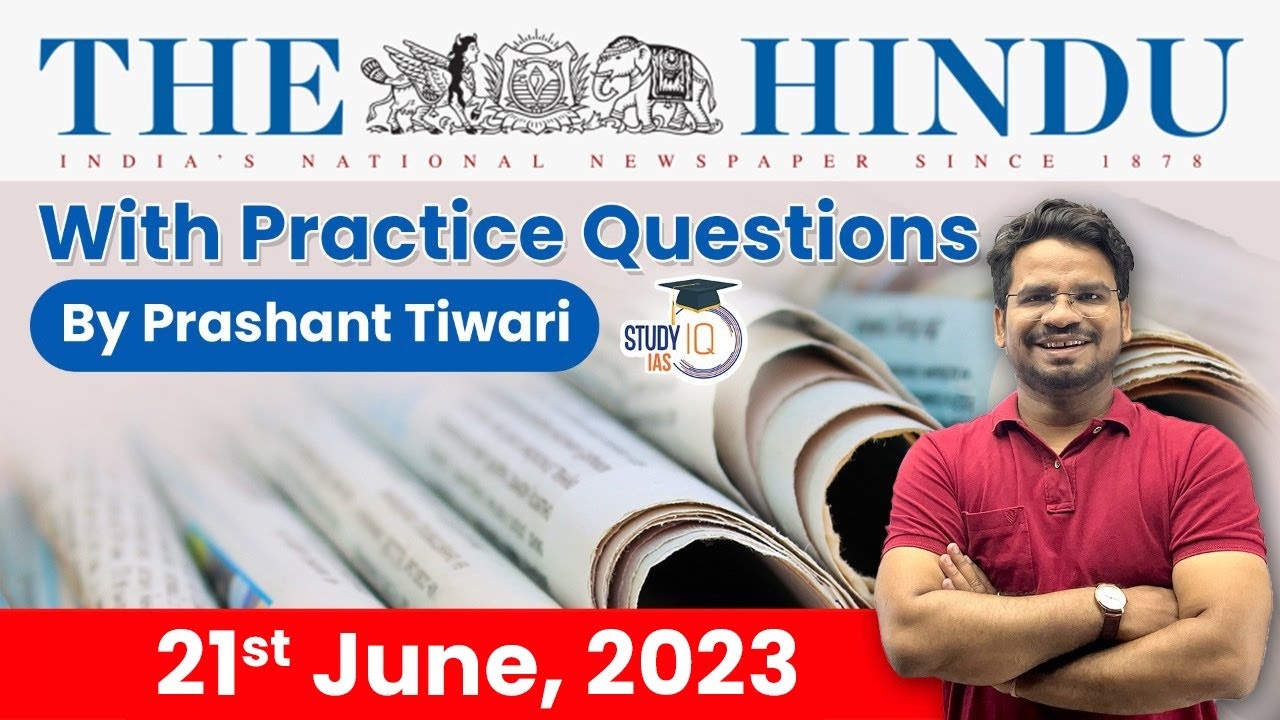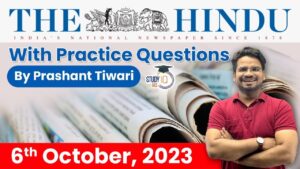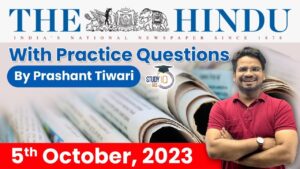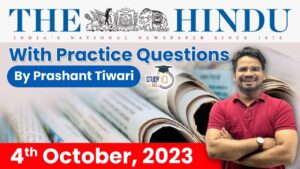The Hindu Newspaper Analysis for UPSC

The Hindu Newspaper Analysis 20 June 2023
- Prime Minister Narendra Modi arrived in New York in the early afternoon of Tuesday on his first state visit to the United States. He is scheduled to lead the International Day of Yoga at the United Nations on Wednesday before flying to Washington DC for the core of his state visit.
- Expected over the next few days are deliverables in global health cooperation, the fight against climate change, defence cooperation, emerging technology and space and in the area of people to people
- The tangible outcomes of the visit are centred around the Initiative for Critical and Emerging Technologies (ICET), launched by the National Security Advisers of both countries in early 2023, to enhance and provide a framework for defence-industrial cooperation between India and the U.S.

- The United States and China this week took a much-needed step towards repairing their relations as Antony Blinken visited Beijing, the first visit by a U.S. Secretary of State since 2018.
- Xi told Mr. Blinken that the international community was “concerned” about the current state of relations and “does not want to see conflict or confrontation”.
- Nations continue to have deep economic linkages with China and close security ties with the U.S.

- To set up a semiconductor fabrication plant in India is not mere There is a growing market. There are also strategic reasons: India’s susceptibility to coercion increases due to its dependence on the import of semiconductors. Therefore, the government’s 2022 Semiconductor Mission is laudable.
- Semiconductor fabrication represents the ultimate frontier of human tech advancement.The frontier has been advancing adhering to Moore’s law that the number of transistors in a unit area doubles every 18 months. But the progress of miniaturisation is accompanied by higher complexity and costs. As a result, the industry has seen a decline in the number of participants.
- China started late in the semiconductor fab industry. But backed by massive government financial support over the last two decades, it acquired hundreds of loss-making fabs from around the world and built its fab industry.
- Developing an ecosystem for chip manufacturing in a greenfield location is a major challenge. Hundreds of chemicals and gases are required for chip fabrication, people need to be trained, and abundant clean water be made available.
Linked Incentive (DLI) Scheme.
- It was announced in December 2021 by MeitY.
- Under this, financial incentives and design infrastructure support will be extended to domestic companies, startups and MSMEs across various stages of development and deployment of semiconductor design for Integrated Circuits (ICs), Chipsets, System on Chips (SoCs), Systems & IP Cores and semiconductor linked design for over 5 years.
- Aims:To create a vibrant ecosystem for Semiconductor Chip Design in the country.
- To promote the domestic manufacturing of semiconductors and allied devices.
- Implementation: C-DAC (Centre for Development of Advanced Computing), a scientific society operating under MeitY, will serve as the nodal agency for the implementation of the DLI scheme.

- China on Tuesday blocked a proposal by India and the U.S. at the United Nations to designate Pakistan-based Lashkar-e-Taiba terrorist Sajid Mir as a global terrorist. Mir is wanted for his involvement in the 26/11 Mumbai terror attacks.
- Beijing blocked the proposal that had been moved by the U.S. and co-designated by India to blacklist Mir under the 1267 Al Qaeda Sanctions Committee of the UN Security Council as a global terrorist and subject him to assets freeze, travel ban and arms embargo.
- What is UNSC 1267 committee?
- It was first set up in 1999, and strengthened after the September 11, 2001 attacks.
- It is now known as the Da’esh and Al Qaeda Sanctions Committee.
- It comprises all permanent and non-permanent members of the
- The 1267 list of terrorists is a global list, with a UNSC stamp.
- What is the process by which people are listed under UNSC 1267?
- Any member state can submit a proposal for listing an individual, group, or entity.
- The 1267 Committee meets as required with a notice of four working days.
- Decisions on listing and de-listing are adopted by consensus.
- The proposal is sent to all the members, and if no member objects within five working days, the proposal is adopted. An “objection” means curtains for the proposal.
- Any member of the Committee may also put a “technical hold” on the proposal, and ask for more information from the proposing member state. During this time, other members may also place their own holds.

- A team of experts from the Union Health Ministry will visit States such as Uttar Pradesh and Bihar to support them in the public health response to heat-related illnesses, Health Minister Mansukh Mandaviya said on Tuesday.
- The Ministry, in a release, said a national action plan on heat-related illness was released in July 2021 outlining the standard operating procedures for surveillance of heat stroke cases and deaths with a preparedness plan before and during the summer.

- In a first, the Women and Child Development (WCD) Ministry has decided to do away with the concept of NGOs running Childline (a counselling and distress relief helpline for children) which has been attending to children under emergency since 1995.
- In the first phase, the Ministry has merged the 1098 helpline with the 112 Emergency Response Support System (ERSS) in nine States Union Territories where operations will start by June-end. They are Andhra Pradesh, Arunachal Pradesh, Bihar, Dadra and Nagar Haveli & Daman & Diu, Gujarat, Goa, Ladakh, Mizoram and Puducherry. The others will be on board in a phased manner, the Ministry official said.
- The Ministry, under the erstwhile Child Protection Services Scheme, was supporting the 24×7 helpline Childline service, through Childline India Foundation (CIF) and its partner NGOs. The CIF had been rendering Childline Services in 568 districts, 135 railway stations and 11 bus stands through its network of 1,000-plus units.


 The Hindu Newspaper Analysis 6 October 2...
The Hindu Newspaper Analysis 6 October 2...
 The Hindu Newspaper Analysis 5 October 2...
The Hindu Newspaper Analysis 5 October 2...
 The Hindu Newspaper Analysis 4 October 2...
The Hindu Newspaper Analysis 4 October 2...





















